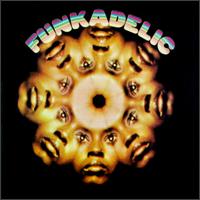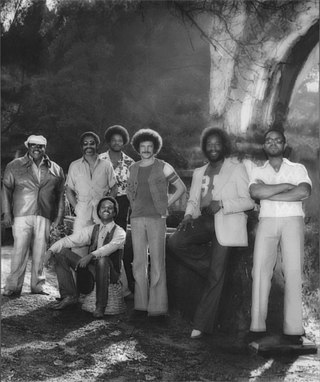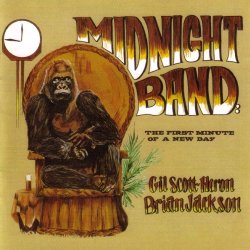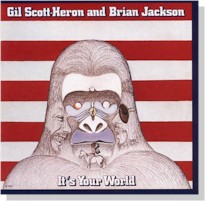
Funkadelic is the debut album by the American funk rock band Funkadelic, released in 1970 on Westbound Records.

War is an American funk/rock/soul band from Long Beach, California, known for several hit songs . Formed in 1969, War is a musical crossover band that fuses elements of rock, funk, jazz, Latin, rhythm and blues, psychedelia, and reggae. According to music writer Colin Larkin, their "potent fusion of funk, R&B, rock and Latin styles produced a progressive soul sound", while Martin C. Strong calls them "one of the fiercest progressive soul combos of the '70s". Their album The World Is a Ghetto was Billboard's best-selling album of 1973. The band transcended racial and cultural barriers with a multi-ethnic line-up. War was subject to many line-up changes over the course of its existence, leaving member Leroy "Lonnie" Jordan as the only original member in the current line-up; four other members created a new group called the Lowrider Band.

Gilbert Scott-Heron was an American jazz poet, singer, musician, and author known for his work as a spoken-word performer in the 1970s and 1980s. His collaborative efforts with musician Brian Jackson fused jazz, blues, and soul with lyrics relative to social and political issues of the time, delivered in both rapping and melismatic vocal styles. He referred to himself as a "bluesologist", his own term for "a scientist who is concerned with the origin of the blues". His poem "The Revolution Will Not Be Televised", delivered over a jazz-soul beat, is considered a major influence on hip hop music.

Brian Robert Jackson is an American keyboardist, flautist, singer, composer, and producer known for his collaborations with Gil Scott-Heron in the 1970s. The sound of Jackson's Rhodes electric piano and flute accompaniments featured prominently in many of their compositions, most notably on "The Bottle" and "Your Daddy Loves You" from their first official collaboration Winter in America.

All Day Music is the fourth album by American band War, released November 1971 on United Artists Records.

Givin' It Back is the ninth album released by The Isley Brothers on their T-Neck imprint on September 25, 1971. After years of having white rock acts covering their most famed material, particularly, "Shout" (1959) and "Twist and Shout" (1961), the Isleys decided to do the same to music made famous by white artists such as Stephen Stills, Eric Burdon and Neil Young. Among the songs they covered were "Spill the Wine", "Love the One You're With", the social commentary medley of "Ohio" and "Machine Gun", "Fire and Rain" by James Taylor and Bob Dylan's "Lay Lady Lay". The Isleys' perseverance paid off when their covers of "Love the One You're With", "Lay Lady Lay" and "Spill the Wine" became charted hits. Bill Withers plays guitar on the Isleys' version of his "Cold Bologna".

Pieces of a Man is the debut studio album by American poet Gil Scott-Heron. It was recorded in April 1971 at RCA Studios in New York City and released later that year by Flying Dutchman Records. The album followed Scott-Heron's debut live album Small Talk at 125th and Lenox (1970) and departed from that album's spoken word performance, instead featuring compositions in a more conventional popular song structure.

Winter in America is a studio album by American vocalist Gil Scott-Heron and keyboardist Brian Jackson. It was recorded in September to October 1973 at D&B Sound Studio in Silver Spring, Maryland and released in May 1974 by Strata-East Records. Scott-Heron and Jackson produced the album in a stripped-down fashion, relying on traditional African and R&B sounds, while Jackson's piano-based arrangements were rooted in jazz and the blues. The subject matter on Winter in America deals with the African-American community and inner city in the 1970s.

The First Minute of a New Day is an album by American vocalist Gil Scott-Heron, keyboardist Brian Jackson, and the Midnight Band—an eight-piece musical ensemble. It was released in January 1975 on Arista Records. Recording sessions for the album took place in the summer of 1974 at D&B Sound in Silver Spring, Maryland. It was the follow-up to Scott-Heron's and Jackson's critically acclaimed collaboration effort Winter in America. The First Minute of a New Day was the first album to feature "Winter in America", the title track of Scott-Heron's previous album which was not featured on its original LP release. The album was reissued on compact disc by Scott-Heron's label Rumal-Gia Records in 1998.

"The Bottle" is a song by American soul artist Gil Scott-Heron and musician Brian Jackson, released in 1974 on Strata-East Records in the United States. It was later reissued during the mid-1980s on Champagne Records in the United Kingdom. "The Bottle" was written by Scott-Heron and produced by audio engineer Jose Williams, Jackson, and Scott-Heron. The song serves as a social commentary on alcohol abuse, and it features a Caribbean beat and notable flute solo by Jackson, with Scott-Heron playing keyboards.

It's Your World is a studio album by American vocalist Gil Scott-Heron and keyboardist Brian Jackson, released in November 1976 by Arista Records. Recording sessions for the album took place in studio and live in July 1976 at Paul's Mall in Boston, Massachusetts, Electric Lady Studios in New York City, and American Star Studios in Merrifield, Virginia. Scott-Heron and Jackson recorded the album with the former's backing ensemble, The Midnight Band. It's Your World was originally released on vinyl and was later re-released in 2000 on compact disc by Scott-Heron's Rumal-Gia label.

The Revolution Will Not Be Televised is a compilation album by American poet Gil Scott-Heron. It was released in 1974 by Flying Dutchman Records and titled after Scott-Heron's 1971 song of the same name.

A New Black Poet - Small Talk at 125th and Lenox, also known simply as Small Talk at 125th and Lenox, is a live album and the first release of recording artist Gil Scott-Heron, released in 1970 on Flying Dutchman Records. Recording sessions for the album were originally said to have taken place live at a New York nightclub located on the corner of 125th Street and Lenox Avenue, but liner notes included in the 2012 box set The Revolution Begins: The Flying Dutchman Masters, Scott-Heron himself insists that a small audience was brought to 'the studio' and seated on 'folding chairs'. By the time of the recordings, Scott-Heron had published a volume of poetry and his first novel, The Vulture. Well received by music critics who found Scott-Heron's material imaginative, Small Talk at 125th and Lenox has been described as "a volcanic upheaval of intellectualism and social critique" by AllMusic editor John Bush.

Bridges is an album by Gil Scott-Heron and Brian Jackson, released in the fall of 1977 on Arista Records.

The Island of Real is the ninth and final studio album by rock band The Rascals, released in 1972. It peaked at number 180 on the Billboard 200 chart. The group's final four singles — “Lucky Day,” “Brother Tree,” “Hummin’ Song” and “Jungle Walk” — failed to make the Top 100 and the Rascals disbanded.

Spirits is the 1994 album by Gil Scott-Heron. The title track is an interpretation of the John Coltrane piece Equinox, and "The Other Side" is a live version of Scott-Heron's 1971 track "Home is Where the Hatred Is" with a new arrangement and many new verses that expand the original to nearly twenty minutes. It was later sampled for "Home" on the 2011 Jamie XX collaboration album, We're New Here.

Secrets is a 1978 studio album by American vocalist Gil Scott-Heron and keyboardist Brian Jackson.

1980 is a studio album by American singer-songwriter Gil Scott-Heron and keyboardist Brian Jackson. Their ninth album together, it was recorded from August to October 1979 during a period of creative tension between the two musicians and released in February 1980 by Arista Records.

Real Eyes is an album by the American poet and musician Gil Scott-Heron, released in 1980. It was Scott-Heron's first album since 1970 to be made without input from his musical collaborator Brian Jackson.
"Johannesburg" is a song by Gil Scott-Heron and Brian Jackson, with music provided by the Midnight Band. It is the first track on Scott-Heron and Jackson's collaborative album From South Africa to South Carolina, released in November 1975 through Arista Records. The lyrics to "Johannesburg" discussed opposition to apartheid in South Africa, and likened apartheid to the disenfranchisement of African Americans in the United States. The song became a popular hit, reaching No. 29 on the Billboard R&B chart in 1975. According to Nelson George, "Johannesburg" played a role in spreading the cultural awareness of apartheid.



















